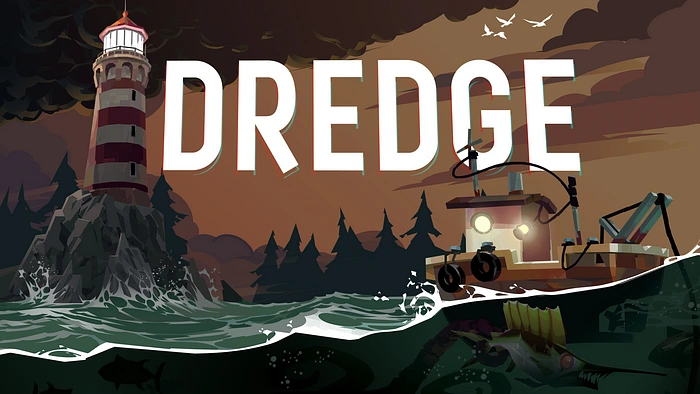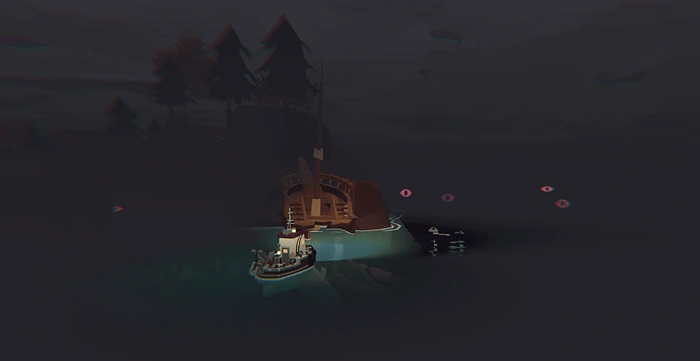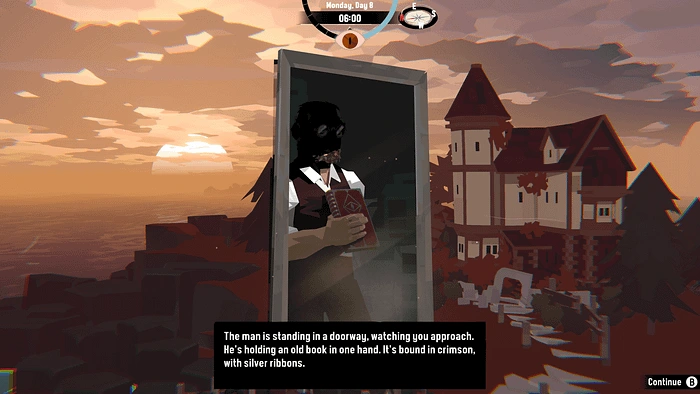Indie Videogame Review
“Keep a close eye on the time. It can creep up on you.”
When I started the game, I hadn’t realized that the currency in Dredge — a fishing slash eldritch horror game from Black Salt Games was — time. In essence, Dredge is a panic management game. And for someone who has always struggled with anxiety, it unlocked an existential dread in me that I have always been afraid to face.

n DREDGE, step into the boots of a down-on-their-luck fisherman and explore a collection of remote islands while scouring the surrounding depths for a variety of fish and valuable, deep-sea curios.
Dredge creeps up on you, literally. From the jump, you aren’t told much. Your gamer brain tells you, it’s another “Cozy Game”. You recognize the patterns of a typical Cozy Game. Idyllic island towns, a little fishing trawler, open seas, delicate piano stylings and a picturesque watercolor palette. It has all the hallmarks of an escapist indie adventure — in the veins of Animal Crossing or Stardew Valley. And the mechanics reinforce that idea — you talk to the locals in the small towns of The Marrows. You do little mini-games to catch fish. And then play a little inventory Tetris to fit your catch in the rather confined hold of your boat. You see that there is an upgrade tree and you feel snug, safe and comfortable because you know what to expect.
And for a while you do — the game lulls you into ignoring the main story. The meditative pacing and the game’s refusal to tell you what to do next removes any “quest marker” related agency from your actions. You are blanketed with safe assurance that all you need to get by, is to catch the right fish. And sell them to the spooky fishmonger to pay off your debt to the Mayor of Greater Marrow.
But then evening rolls in with claustrophobic fog, demonic whispers, unforgiving tempests, and eldritch creatures. But worst of all — limited visibility. The night blankets you from all directions. Your boat’s lights fail. You feel a dread rising in your chest. All that comfort of knowledge you had, is ripped away from you in an instant. And for the first time, you notice the giant bloodshot eyeball on top of your screen. Peering at your soul, urging you to grasp onto the last vestiges of your sanity. Every second in the ink-clad sea sinks you deeper into madness. Whispers echo in the wind. Something bumps your hull. A tentacle slithers into your hold. The world that you knew, no longer exists.

You might not like what finds you in the dark…
The game doesn’t tell you any of this, it just happens. Your assumptions about the world are responsible for the dread you feel. This is “videogame design” of the utmost quality. It never forces your hand. You are a seafarer, free to decide where your motors take you, but the price you pay is time and the cost is your sanity. It’s a constant tug and pull between the choice of a safe harbor or the stygian depths. You can hide in the sun-drenched shores’ safety. You can choose to ignore the abyssal truths hidden in the darkness. And I couldn’t help but ask myself, is that a good way to live one’s life?
Talking of design, I couldn’t help but notice that time in the game stands still when I do. The waves don’t carry me off like driftwood. Life doesn’t move forward if I choose to stand still. That nudge towards exploring the depth and breadth of this world is baked into the design. I know it’s inherent in video games that moving…moves the game forward. But it carries a different sort of weight in Dredge, moving expends the game’s most premium currency — time. Every chug of the boat takes you deeper towards the night. So, you keep asking yourself do you venture to that part of the map you haven’t been to yet? Where no port is guaranteed? Where no safety is promised? There is this constant panic as you watch the clock winding down.
While the game is about fishing up eldritch horrors for fun and profit, it evokes a deep-seated fear in me. The fear of the unknown and venturing into it. I am and always have been on the “ship in the harbor” team. I am not made for the rough seas. I like the safety and warmth of knowing exactly what tomorrow brings. However delusional that might be. I revel in not testing my boundaries. And in the safety of not having the world react to the empirical testing of my set boundaries. I have always been risk-averse. It’s why I play video games, the stakes are all imaginary. I don’t need to finish the game and save the world, it is not a prerogative. If the game gets too heavy for me, I can put down the controller and go do something else. Or even play something else. As such my ever-growing stack of unfinished games keeps growing. It’s escapism for me. Nothing truly matters when it’s a silly video game, right?
Dredge, for lack of a better word, dredges up that old philosophical question. Do I venture into the pitch-black darkness to find answers that I will not like? Do I risk everything to find out the truth about myself and the world around me? Do I want to know why I am here and what my purpose is? Or do I keep existing, doing what is required of me to eke out a living? Never facing my past and never moving on from its shadow?
Alex Ritchie, the lead artist of the game, says the core gameplay loop that has always been the backbone of Dredge is: Go Out > Get Fish > Sell > Upgrade > Go Out > Get Caught At Night. Thus, I am aware that the developers never intended to have this kind of profound effect on anyone. But I couldn’t help but reflect on my life while playing Dredge. Part of that was due to the meditative nature of the game. The day brings respite from the night — warm, safe sunshine and the catch of day bobbing by. But it also gave me time to think about my own nature and my life. My mind was running down the clock on my life in time with the in-game clock. And that goddamn eye — judging me for every opportunity I passed by. For every girl I never talked to. For every bad relationship, I stayed in too long. For every family event I missed. I grasped with existential dread and regret every moment I spent with the game.

Captain your fishing trawler across a collection of remote islands, each with its own inhabitants to meet, wildlife to discover, and stories to unearth
The hands-off approach of Dredge lets you be in charge of exploration and thus rewards you for it. Every discovery is a joy. A floating message in a bottle. A dog who needs a home. A stranded sailor. Pirate treasure! There are no quest markers anywhere, and the ship’s log is purposefully vague. You are to make sense of this world with the information that you gather. You have to remember what the shortest routes are and where the landmarks are. You have to maintain your bearings because the game won’t give you a dotted line.
Every onus is on you. Just like in real life.
As I neared the end, I felt like the game was telling me that everything I ever wanted was on the other side of my front door. And that’s what this is about. Because somewhere in the realm of what we don’t know is what we need most. Not because it is some ultimatum. But because the things that make life fun, exciting, intriguing and ultimately worthwhile — they live on the other side of the darkness.
Like this project
Posted Aug 31, 2023
A review article for the indie videogame Dredge detailing gameplay, concepts and mechanics. The article has an Average time spent on the page of 2 minutes.







